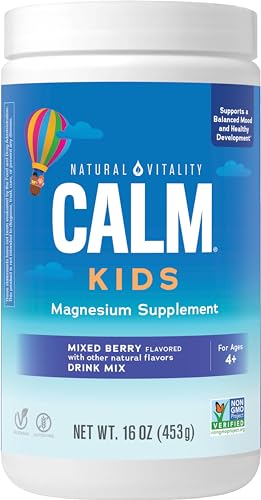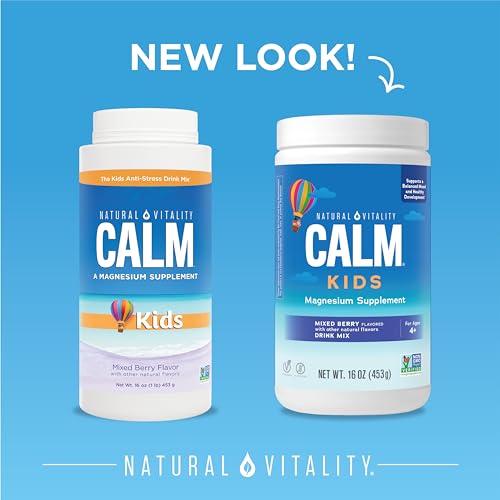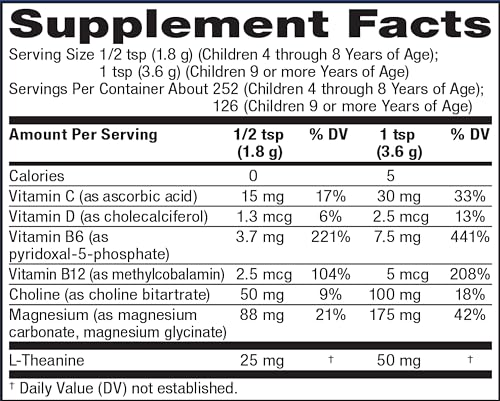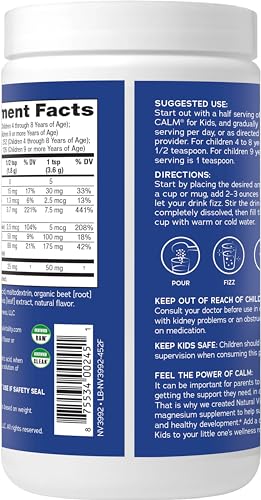



Natural Vitality Calm Sleep Magnesium Drink Mix - Supports Relaxation & Mood, Vegan, 16oz


Vitamin D3
High RiskVitamin D3, also known as cholecalciferol, is a fat-soluble vitamin important for calcium metabolism and bone health. It is synthesized in the skin upon exposure to sunlight and is also found in some foods and supplements. Its primary function is to promote the absorption of calcium and phosphorus in the body.
Sustai Insights
Vitamin D3 offers functional benefits such as supporting bone health and immune function. However, excessive intake can lead to toxicity, presenting risks like hypercalcemia. Environmental concerns include its potential for bioaccumulation. Regulatory bodies impose usage restrictions due to these risks, resulting in a high overall risk assessment. Safe usage practices should be observed, and alternatives such as vitamin D2 may be considered.
Citric Acid
Medium RiskCitric acid is an alpha hydroxy acid used in personal care products primarily for its role as a pH adjuster and natural preservative. It occurs naturally in citrus fruits and is commonly utilized in various formulations for its chelating properties and mild exfoliation benefits.
Sustai Insights
Citric acid offers functional benefits as an effective preservative and pH stabilizer, contributing to product longevity and stability. It is biodegradable and derived from renewable sources. Health risks are low, with minimal concerns regarding carcinogenicity, allergies, and reproductive toxicity. However, moderate use restrictions exist due to potential irritation at high concentrations. Environmental risks are limited, as citric acid is not known to accumulate in ecosystems. Regulatory agencies have no significant advisories against its use. Overall, it is assessed as a medium-risk ingredient, with safe usage practices recommended and alternatives available.
Maltodextrin
Low RiskMaltodextrin is a saccharide material obtained from starch through partial hydrolysis. It is commonly used as a thickener, filler, or preservative in food and cosmetic products due to its ability to enhance texture and stability.
Sustai Insights
Maltodextrin serves as an effective thickener and stabilizer in various products, and it is typically derived from renewable sources. Health risks are minimal, as it poses low concerns for carcinogenicity, allergies, and developmental toxicity. Environmental impacts are also low, with no significant pollutant or bioaccumulation potential. Regulatory bodies do not impose major restrictions on its use. Overall, maltodextrin presents a low-risk profile, making it a widely accepted ingredient in food and cosmetic formulations.
Black Tea
Low RiskBlack tea is a type of tea made from the leaves of the Camellia sinensis plant, fully oxidized during processing. It is widely consumed and serves various purposes in food and beverage products, primarily for its flavor and potential health benefits.
Sustai Insights
Black tea offers functional benefits such as antioxidant properties and flavor enhancement. It is generally regarded as safe, with low concerns regarding cancer, allergies, and reproductive toxicity. Environmental risks are minimal, and it is not classified as a pollutant. Regulatory bodies have no current warnings or restrictions on its use, resulting in an overall low risk assessment. Safe usage practices include moderation in consumption. Alternatives like green tea may provide similar benefits with potentially less caffeine.
Magnesium
Low RiskMagnesium is a mineral commonly found in various products, serving primarily as a nutrient that supports multiple biological functions, including muscle and nerve function, and energy production. It is often included in dietary supplements and fortified foods to address magnesium deficiency.
Sustai Insights
Magnesium offers functional benefits such as aiding in muscle relaxation and energy production, making it an important nutrient. It is sustainably sourced and generally considered low risk, with minimal health concerns related to cancer, allergies, or reproductive toxicity. Environmental risks are also low, as it does not contribute significantly to pollution or bioaccumulation. Regulatory status is favorable, with no current restrictions. Safe usage practices involve adhering to recommended dietary allowances. Overall, magnesium is a low-risk ingredient with no significant adverse effects, making it a suitable choice in various applications.
Choline Bitartrate
Low RiskCholine bitartrate is a salt of choline, an essential nutrient that plays a critical role in various physiological functions, including cell membrane integrity, neurotransmitter synthesis, and lipid metabolism. It is commonly used as a dietary supplement and ingredient in functional foods to support cognitive health and liver function.
Sustai Insights
Choline bitartrate is valued for its role in supporting cognitive function and liver health. It is generally recognized as safe, with low concerns regarding cancer, allergies, or reproductive toxicity. Environmental risks are minimal, with no known issues of bioaccumulation or significant pollution. Regulatory bodies have not imposed restrictions. Overall, it is considered low risk, though safe usage practices should be observed. Alternatives like phosphatidylcholine may offer similar benefits with potentially enhanced bioavailability.
Cobinamide, Cobalt Methyl Derivative, Hydroxide, Dihydrogen Phosphate (Ester), Inner Salt,3'
Low RiskCobinamide, a cobalt methyl derivative, serves primarily as a cofactor in enzymatic processes and is involved in the metabolism of certain compounds in the body. It is not currently associated with skin sensitization or common use restrictions.
Sustai Insights
Cobinamide is recognized for its role in metabolic functions and has low associated health risks, including negligible concerns regarding carcinogenicity, allergies, or reproductive toxicity. Environmentally, it poses minimal risk, lacking bioaccumulative properties or significant pollution potential. Regulatory bodies do not impose restrictions on its use, indicating a low-risk profile overall. Safe usage practices are advisable, and while alternatives are limited, seeking sustainable sourcing methods is encouraged.
Ascorbic Acid (Vitamin C)
Low RiskAscorbic acid (Vitamin C) is a naturally occurring antioxidant essential for various biological functions, including collagen synthesis and immune response. It is commonly used in cosmetic and food products for its preservative properties and ability to enhance skin brightness.
Sustai Insights
Ascorbic acid provides functional benefits as an effective antioxidant and preservative, contributing to skin health and product stability. It is generally recognized as safe with low health risks, including minimal concerns for carcinogenicity and allergies. Environmentally, it poses low risks, as it is biodegradable and does not bioaccumulate. Regulatory bodies like the FDA have not imposed significant restrictions on its use. Overall, the ingredient presents a low risk, with safe usage practices ensuring consumer safety, and alternatives such as natural extracts exist for those seeking different formulations.
Maltodextrin
Low RiskMaltodextrin is a saccharide material obtained from starch through partial hydrolysis. It is commonly used as a thickener, filler, or preservative in food and cosmetic products due to its ability to enhance texture and stability.
Sustai Insights
Maltodextrin serves as an effective thickener and stabilizer in various products, and it is typically derived from renewable sources. Health risks are minimal, as it poses low concerns for carcinogenicity, allergies, and developmental toxicity. Environmental impacts are also low, with no significant pollutant or bioaccumulation potential. Regulatory bodies do not impose major restrictions on its use. Overall, maltodextrin presents a low-risk profile, making it a widely accepted ingredient in food and cosmetic formulations.
Black Tea
Low RiskBlack tea is a type of tea made from the leaves of the Camellia sinensis plant, fully oxidized during processing. It is widely consumed and serves various purposes in food and beverage products, primarily for its flavor and potential health benefits.
Sustai Insights
Black tea offers functional benefits such as antioxidant properties and flavor enhancement. It is generally regarded as safe, with low concerns regarding cancer, allergies, and reproductive toxicity. Environmental risks are minimal, and it is not classified as a pollutant. Regulatory bodies have no current warnings or restrictions on its use, resulting in an overall low risk assessment. Safe usage practices include moderation in consumption. Alternatives like green tea may provide similar benefits with potentially less caffeine.
Citric Acid
Medium RiskCitric acid is an alpha hydroxy acid used in personal care products primarily for its role as a pH adjuster and natural preservative. It occurs naturally in citrus fruits and is commonly utilized in various formulations for its chelating properties and mild exfoliation benefits.
Sustai Insights
Citric acid offers functional benefits as an effective preservative and pH stabilizer, contributing to product longevity and stability. It is biodegradable and derived from renewable sources. Health risks are low, with minimal concerns regarding carcinogenicity, allergies, and reproductive toxicity. However, moderate use restrictions exist due to potential irritation at high concentrations. Environmental risks are limited, as citric acid is not known to accumulate in ecosystems. Regulatory agencies have no significant advisories against its use. Overall, it is assessed as a medium-risk ingredient, with safe usage practices recommended and alternatives available.
Magnesium
Low RiskMagnesium is a mineral commonly found in various products, serving primarily as a nutrient that supports multiple biological functions, including muscle and nerve function, and energy production. It is often included in dietary supplements and fortified foods to address magnesium deficiency.
Sustai Insights
Magnesium offers functional benefits such as aiding in muscle relaxation and energy production, making it an important nutrient. It is sustainably sourced and generally considered low risk, with minimal health concerns related to cancer, allergies, or reproductive toxicity. Environmental risks are also low, as it does not contribute significantly to pollution or bioaccumulation. Regulatory status is favorable, with no current restrictions. Safe usage practices involve adhering to recommended dietary allowances. Overall, magnesium is a low-risk ingredient with no significant adverse effects, making it a suitable choice in various applications.
Choline Bitartrate
Low RiskCholine bitartrate is a salt of choline, an essential nutrient that plays a critical role in various physiological functions, including cell membrane integrity, neurotransmitter synthesis, and lipid metabolism. It is commonly used as a dietary supplement and ingredient in functional foods to support cognitive health and liver function.
Sustai Insights
Choline bitartrate is valued for its role in supporting cognitive function and liver health. It is generally recognized as safe, with low concerns regarding cancer, allergies, or reproductive toxicity. Environmental risks are minimal, with no known issues of bioaccumulation or significant pollution. Regulatory bodies have not imposed restrictions. Overall, it is considered low risk, though safe usage practices should be observed. Alternatives like phosphatidylcholine may offer similar benefits with potentially enhanced bioavailability.
Vitamin D3
High RiskVitamin D3, also known as cholecalciferol, is a fat-soluble vitamin important for calcium metabolism and bone health. It is synthesized in the skin upon exposure to sunlight and is also found in some foods and supplements. Its primary function is to promote the absorption of calcium and phosphorus in the body.
Sustai Insights
Vitamin D3 offers functional benefits such as supporting bone health and immune function. However, excessive intake can lead to toxicity, presenting risks like hypercalcemia. Environmental concerns include its potential for bioaccumulation. Regulatory bodies impose usage restrictions due to these risks, resulting in a high overall risk assessment. Safe usage practices should be observed, and alternatives such as vitamin D2 may be considered.
Cobinamide, Cobalt Methyl Derivative, Hydroxide, Dihydrogen Phosphate (Ester), Inner Salt,3'
Low RiskCobinamide, a cobalt methyl derivative, serves primarily as a cofactor in enzymatic processes and is involved in the metabolism of certain compounds in the body. It is not currently associated with skin sensitization or common use restrictions.
Sustai Insights
Cobinamide is recognized for its role in metabolic functions and has low associated health risks, including negligible concerns regarding carcinogenicity, allergies, or reproductive toxicity. Environmentally, it poses minimal risk, lacking bioaccumulative properties or significant pollution potential. Regulatory bodies do not impose restrictions on its use, indicating a low-risk profile overall. Safe usage practices are advisable, and while alternatives are limited, seeking sustainable sourcing methods is encouraged.
Ascorbic Acid (Vitamin C)
Low RiskAscorbic acid (Vitamin C) is a naturally occurring antioxidant essential for various biological functions, including collagen synthesis and immune response. It is commonly used in cosmetic and food products for its preservative properties and ability to enhance skin brightness.
Sustai Insights
Ascorbic acid provides functional benefits as an effective antioxidant and preservative, contributing to skin health and product stability. It is generally recognized as safe with low health risks, including minimal concerns for carcinogenicity and allergies. Environmentally, it poses low risks, as it is biodegradable and does not bioaccumulate. Regulatory bodies like the FDA have not imposed significant restrictions on its use. Overall, the ingredient presents a low risk, with safe usage practices ensuring consumer safety, and alternatives such as natural extracts exist for those seeking different formulations.
Experience the soothing benefits of Natural Vitality Calm Sleep, a vegan and gluten-free magnesium drink mix designed to promote relaxation and support kids' overall health. This delightful mixed berry-flavored supplement combines essential vitamins, L-theanine, and magnesium citrate to help create a calming bedtime routine for your child.
- Supports Balanced Mood: Helps maintain healthy muscle function and promotes a sense of calm, aiding in mood regulation and relaxation.
- Kid-Friendly Formula: A delicious mixed berry drink that makes taking supplements enjoyable for children, encouraging consistent use.
- Nutrient-Rich Ingredients: Includes essential vitamins and L-theanine, supporting your child’s development while enhancing overall well-being.
- Allergy-Friendly: Non-GMO, vegan, and gluten-free, with no artificial flavors or synthetic colors, ensuring a worry-free supplement choice.
- Daily Wellness Routine: Easy to prepare—just mix with water and enjoy before bedtime to maximize relaxation and sleep quality.
Natural Vitality is committed to holistic sustainability and community impact, making their products a trusted choice for health-conscious families.
Subscribe & Save with Sustai
- Best Price Guarantee: Always enjoy the lowest prices on sustainable home essentials.
- No Surprises: We’ll notify you before shipping. No hidden fees, ever.
- You’re in Charge: Change, pause, or cancel your subscription anytime with ease.
- Eco-Friendly Deliveries: Our grouped shipments mean less packaging and lower emissions.
Join us on a sustainable journey. Special offers for a limited time! Prices and promotions may change.
Recommended Products
Experience the soothing benefits of Natural Vitality Calm Sleep, a vegan and gluten-free magnesium drink mix designed to promote relaxation and support kids' overall health. This delightful mixed berry-flavored supplement combines essential vitamins, L-theanine, and magnesium citrate to help create a calming bedtime routine for your child.
- Supports Balanced Mood: Helps maintain healthy muscle function and promotes a sense of calm, aiding in mood regulation and relaxation.
- Kid-Friendly Formula: A delicious mixed berry drink that makes taking supplements enjoyable for children, encouraging consistent use.
- Nutrient-Rich Ingredients: Includes essential vitamins and L-theanine, supporting your child’s development while enhancing overall well-being.
- Allergy-Friendly: Non-GMO, vegan, and gluten-free, with no artificial flavors or synthetic colors, ensuring a worry-free supplement choice.
- Daily Wellness Routine: Easy to prepare—just mix with water and enjoy before bedtime to maximize relaxation and sleep quality.
Natural Vitality is committed to holistic sustainability and community impact, making their products a trusted choice for health-conscious families.

You can have at most 2 Sustainable Steals products in your cart
Customer Reviews
Customers’ View
Customers appreciate the calming effects and overall effectiveness of the Sleep Aid Drink Mix, noting its ability to help children relax and sleep better. Many highlight that it supports healthy development by aiding mood and reducing night terrors, with one user stating it has significantly improved their child's behavior. The product is praised for its easy-to-use formula that mixes well with water, making it a convenient addition to nightly routines. However, some customers have expressed concerns about the taste, describing it as sour or too sweet, and a few have noted dissatisfaction with the bottle size. Overall, this product aligns well with health-conscious values due to its vegan, gluten-free, and non-GMO formulation.
AI-generated from the text of customer reviewsThis product is rated 5.0 of 5.0 stars.
It has received 1 review.




